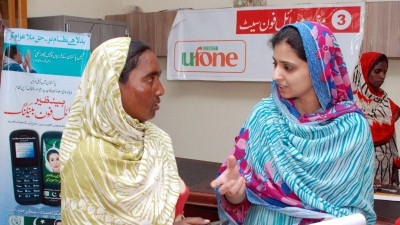Cell phones discourage fraud
Originally, social assistance payments were delivered through money orders, but many clients complained that post office officials were demanding bribes before handing over BISP payments, says a BISP official based at its headquarters in Islamabad.
To bring efficiency and transparency through modern technology, it was decided to try this new system in five urban districts where cell connectivity is most reliable. A cell company partner offered free handsets. Elsewhere, other beneficiaries are receiving bank debit cards to collect their payments through any automatic teller machine or point of sale at the partner Bank’s agent network.
The female representatives of beneficiary families are given the payments and phones in a conscious effort to improve household welfare, encourage female empowerment, promote financial literacy, and discourage fraud, says BISP.
BISP clients must bring their national identity cards and have their thumbprints checked against the national ID registry before receiving their brand-new handsets. When benefit payments are automatically deposited in their bank accounts, women get a text or recorded message notifying them that it’s available for withdrawal.
“It’s an exciting initiative that seems to be working well,” says the BISP official.
Children help read text messages
In Rawalpindi district on the outskirts of Islamabad, Nazia Bibi, 39, says she has used her BISP cell phone for a year without many problems. Her only concern seems to be the cost of getting to town to collect her funds. Being illiterate, she also can’t read text messages that notify her of money deposits.
“But my two sons go to school, so they tell me these things,” says Nazia, whose husband is a sweeper and struggles to support their five children.
Staring at a hole in the roof over their one-room home, Nazia says she’s hoping to save repair money before the monsoon rains start. “Our life is simple, but we are trying,” she adds, gazing around the room barely big enough for one bed displaying a dusty teddy bear.
Another neighbor, Jamila Bibi, 37, says she has used the cell phone system for a year now. Not only does it deliver her money as promised, but she sometimes chats with her brother on the phone.
Pointing to her husband dozing in a corner of their home, Jamila says: “He works as a night guard, so I am alone with the children. It is nice to have this phone for company and safety.”
Jamila says she relies on her daughter, Huma Shafiq, to decipher messages about bank deposits. “She plans to be a teacher,” says Jamila, giving Huma a proud hug.
Down another twisting lane, Saba Shabbir also reports few issues with her phone.
She does worry about the cost of traveling to the bank, but otherwise the system is working well, she says.
Her eldest son, a jewelry maker, does borrow her phone sometimes, but he buys his own phone cards and is careful to return it, says Shabbir. “My husband never asks for it or interferes in any way,” she says. “I am using it for collection of BISP payments and it is very important to us.”

